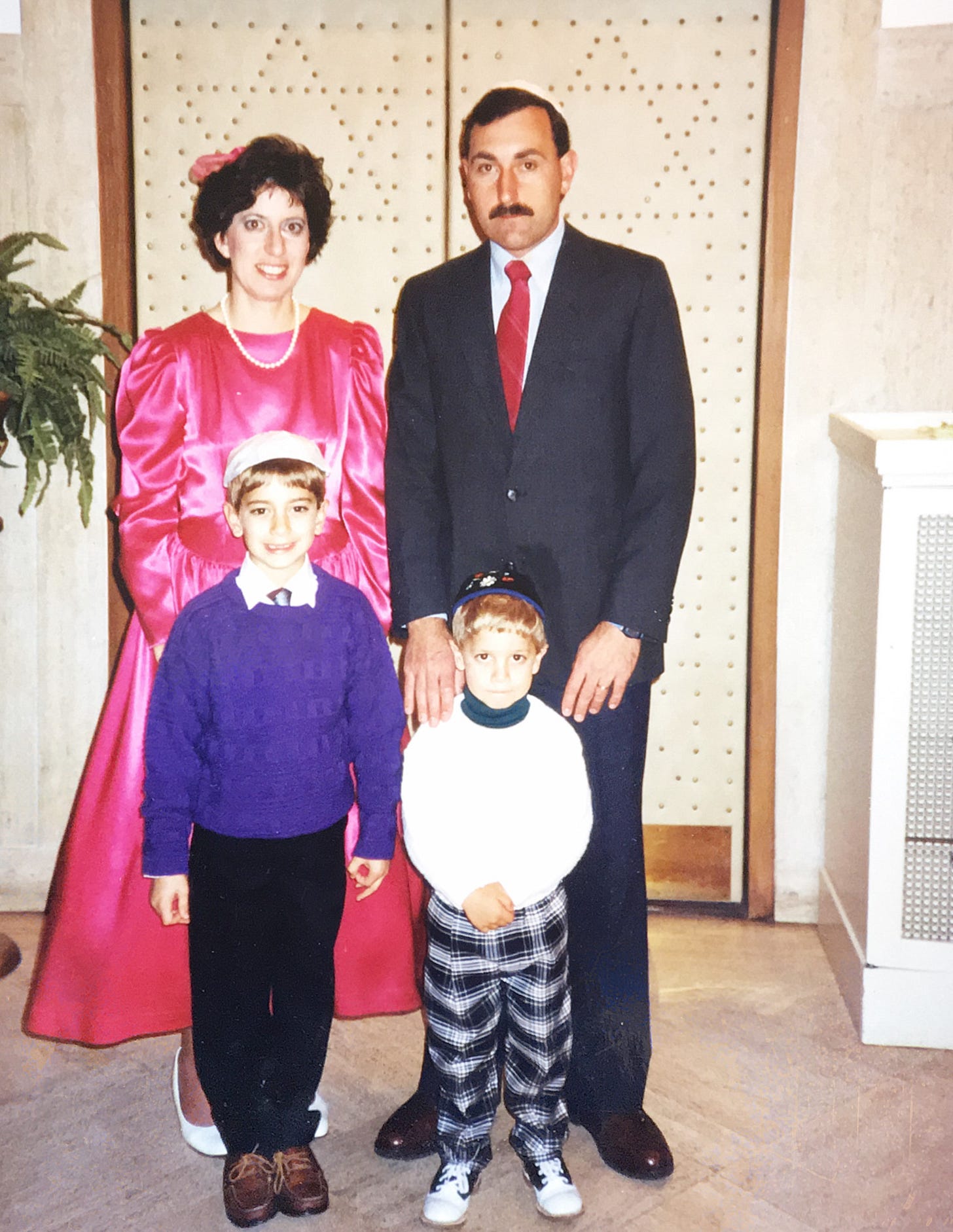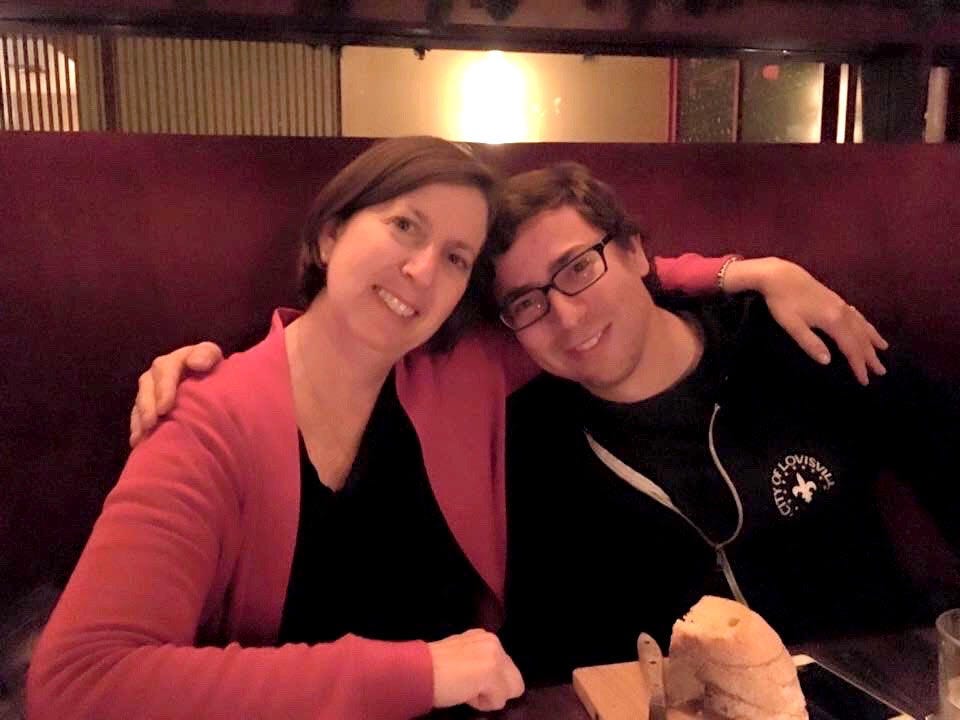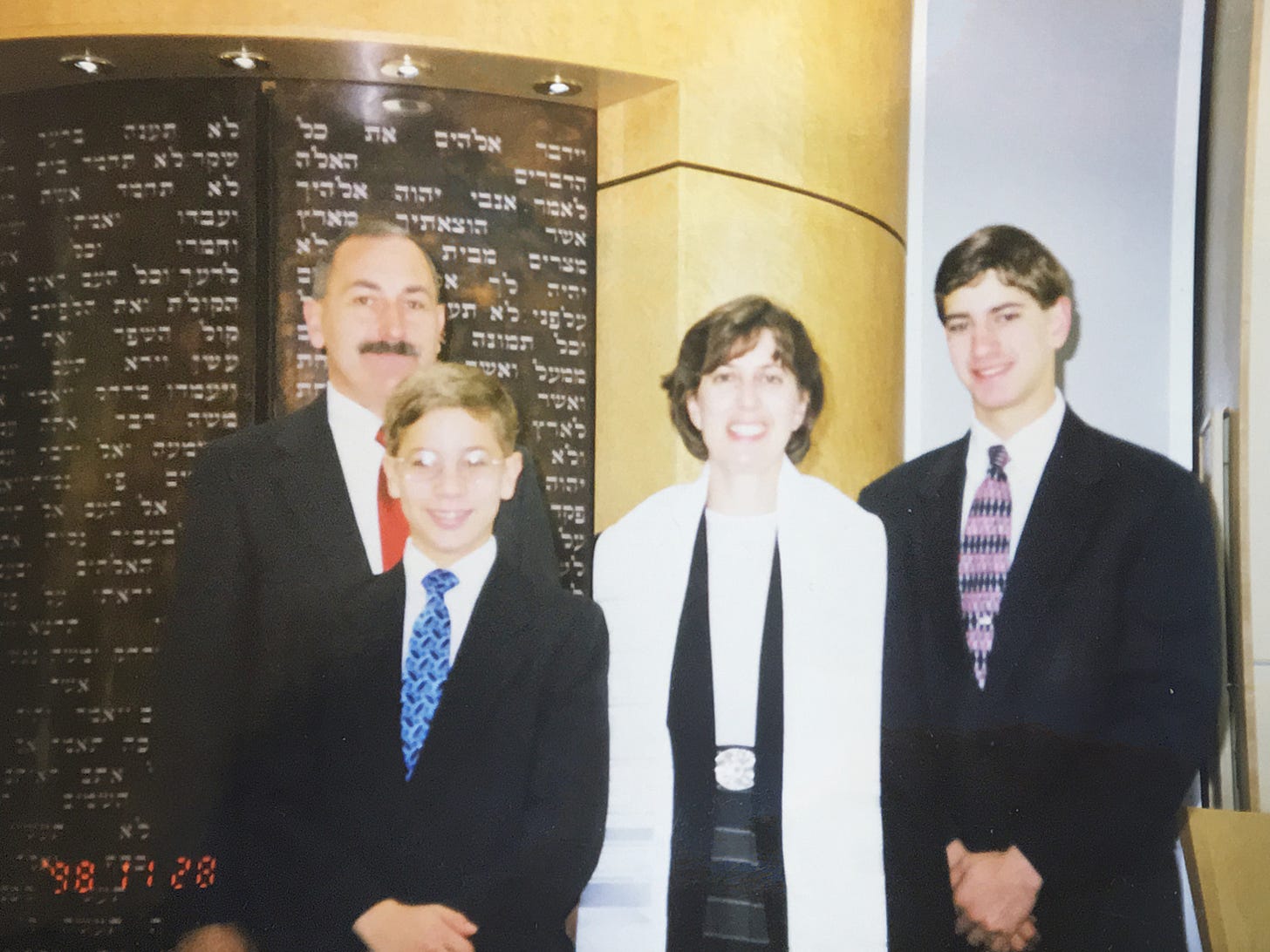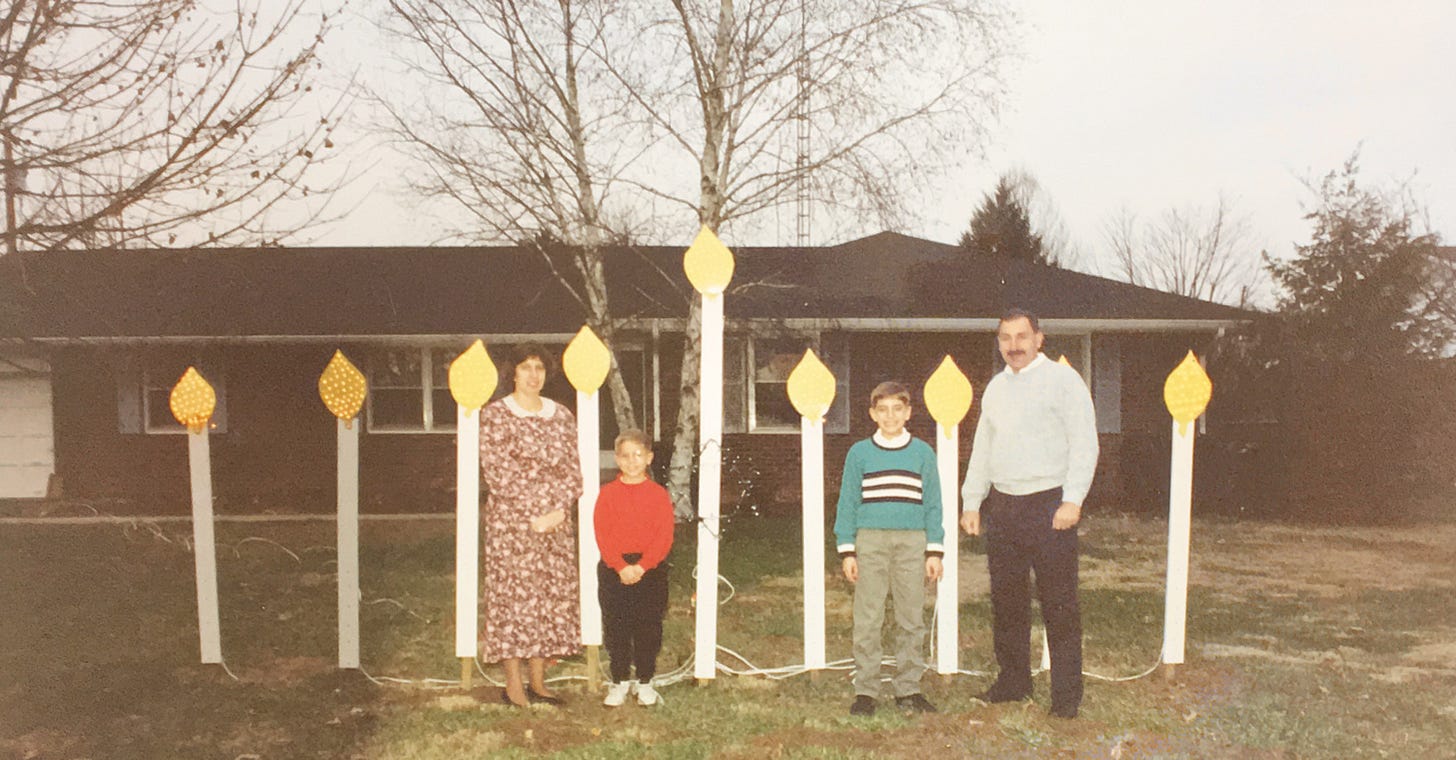Bluegrass, Bourbon, and B'nai Mitzvahs
An interview with Nathan Vaughan, whose new podcast explores themes of interfaith and southern families.
This week’s Drop is dedicated to the memory of Yakir Hexter z”l, the nephew of my colleague, who was killed in Gaza this week alongside his study partner while fighting bravely to protect Israel and the Jewish people. As I told my colleague, this post may not be scholarly or about Torah, but it’s about something deeper: Jewish connectedness and family.
From Copenhagen to Kentucky, there’s Jewish life and stories waiting to be uncovered if you know where to find them. Luckily, Nathan Vaughan, podcast producer and masterful storyteller, has been documenting his family’s history on his new podcast, “72 Miles Til Kentucky” as a way to preserve these memories.
Listening to 72 Miles is like accompanying a friend on a journey as he returns to his roots, connecting deeper to his Judaism while recording family members who share sincere and heartwarming anecdotes along the way. Take his dad for example, who fell in love Nathan’s Jewish mom at a Baptist church when she was there working as a sign language interpreter. Together, they started a beautiful, southern, interfaith family. These lived experiences often mirror those conjured in I.J. Schwartz’s epic Yiddish poem titled “New Earth,” which follows the life of a Jewish blacksmith, newly immigrated from Lithuania, who settles in rural Kentucky with his wife and young son.
The stories go down easy like a glass of bourbon, tracing 150 years of Kentucky history, full of experiences that resonate today—being Jewish in America, being Jewish and southern, the lives of interfaith families, and finding creative ways to maintain one’s identity while experiencing small-town Jewish life.
I interviewed Nate, who produces our podcast at work, on how he started this project. And why 72 miles? Well, you’re going to have to listen to his podcast to find out.
Tell us about your family background and how your family ended up in Kentucky.
My mother was born in Trenton, MI, the third of six children in a tight-knit Jewish community just south of Detroit where almost everyone was related. She attended a synagogue named for her great-grandparents, and the iconic department store in town was owned by her aunt, but my mother was born to a less wealthy branch of the family. She never received a Jewish education, so she fell in with an evangelical youth group instead, and wound up running away to a private Christian college in Kentucky.
My father was born to a southern Baptist family with over two hundred years of history in North Carolina, mostly as poor white folks. He was drafted into the Air Force during Vietnam and became the first person in his family to go to college, using his G.I. Bill benefits to earn an engineering degree at the University of Louisville. After four years on base, when he went away to college, his mother insisted that he find a church home. He picked Walnut Street Baptist Church because the service was telecast, and his mother watched at home, which meant she could always see that he was in church. That's where he met my mother, a nice Jewish girl from Detroit, who was working one Sunday morning, signing the service as an ASL interpreter.

What gave you the idea to start the podcast?
My mother's third career was as a Jewish educator and interim administrator for large Reform synagogues in moments of transition. In those roles, she met and counseled hundreds of interfaith families, using her own life experience as a guide. At length, she started to wonder if there was value to our family's stories, and how we could share those stories in ways that could support others on similar journeys. We started thinking about consulting, then life-coaching, even considered a cookbook. Finally we settled on a podcast, one that would share our stories, place them in context, and say something about the future of the American Jewish community.
What has growing up in an interfaith family taught you?
Values can truly be universal, and if you're looking for community then perception matters too. I was raised in three distinctive religious traditions, and while I have always strongly identified myself as Jewish, I've learned from each of these traditions. I wish Jews took a moment in our service to "pass the peace" like Presbyerians do, because there's nothing more pleasant than smiling at someone and saying "peace be with you, my friend." And I probably only add the friend on because my father was a practicing Quaker. In a world where language is so important, the power of addressing every single person as "Friend" simply cannot be understated. The next time you feel an urge to say "sir" or "dude" or "buddy" try friend instead. It makes a remarkable difference for people to know they are your friend.
What has being a southern Jew taught you?
A friend and professor of mine, Dr. Rachel Fish, who's from Cookeville, TN probably sums it up best, a lesson she credits to her own father — to paraphrase her, "There is a tremendous privilege, pleasure, and responsibility in being the first and probably only Jewish person someone will ever meet in their lifetime."
Any funny story you’d like to share?
I played a lot of Christmas music at band recitals in high school, and most years I marched in the town Christmas, playing "Winter Sleigh Ride" on a loop. By my senior year I was more than a little fed up. So I went on the internet, found the sheet music to "I Have a Little Dreidel" and asked my band teacher if I could play it for the winter concert. He agreed, and just like that I was a soloist.
I practiced every day. The sheet music I had downloaded was for piano, but I was a percussionist in high school who didn't play piano. So I chose the next best instrument, the xylophone. Loud enough to be heard by itself in an auditorium, with keys laid out exactly like a piano, I could hack the notes out on a xylophone the way people type with two fingers, just well enough to get by. The day of the concert approached, but I hadn't told my parents yet. In those days I was old enough to drive myself to school, and afterschool activities. So the first time my parents heard about my solo was when they arrived for the concert, and saw my name printed in the program while other parents kvelled that they couldn't wait to hear "Nathan play the Jewish song."
When my moment came, just before the intermission, the whole band stood and exited the stage, while I stayed behind, in the very back with all the percussion instruments. The band director strolled up to the microphone, said "And now, a solo by Nathan Vaughan," winked at me, and then abandoned me on stage before 1,000 people, including my parents.
I've never been a stellar musician, so I was pretty nervous. I hacked out the few notes, and made it through about half the song, feeling pretty confident. Then I came to the tricky part, which always gave me trouble. The pattern changed and like I'd done a thousand times before I accidentally paused for half a heartbeat while remembering where to go next, but this time I couldn't remember. So I stood there, hunched over the xylophone with the mallets in my hand, halfway through a song I'd known all my life, totally stuck on what to play, with a silent and seemingly rapt audience in front of me. So, in my nervousness, I slowly whispered to myself, "fuck..." Twenty feet away, the microphones were still on, and with my head still down I heard that word reverberate through the room. It hung in the air for a heartbeat or two, until suddenly the whole room burst out laughing. "I forgot the rest," I said, before bowing and running off stage.
Shabbat Shalom. May your Shabbat be filled with storytelling,
Shabbat Drop-ins
📅 Repair the World NY is hosting an amazing MLK Weekend of Service! If your Jewish values include a commitment to justice, this is a wonderful opportunity to put those values into action and make a tangible impact. Dr. King once said, "Life's most persistent and urgent question is, 'What are you doing for others?'" Join us in answering that question and being a force for good. Explore the programs and register here.
📅 Don’t forget about virtual Shabbat Drop book club! Join us on Sunday, January 28th at 5pm ET to discuss Here All Along by Sarah Hurwitz and Jewish identity, what we think about G-d, and other sects of Judaism. You know, shallow stuff…






I always find something of great interest to learn at your site. When I think of Jews coming to America I mostly have an image of Ellis Island and the Lower East side, and thus, in reading about Jews in the American South, I wonder how, when, why they go there. And yet, my focus on NY and Ellis Island is of course wrong for Jews had come to the Western world long before that, as stated here:
"By 1679, there were about 300 Jews living in Barbados. Their numbers peaked in the 1700's to 800 people. For 112 years the Jews in Barbados continued to live and work under discrimination of one kind or another. Not until 1831 were they granted permanent and practical freedom in both civil and political matters."
What a wonderful SD. Years ago I was in Nashville for a summer at Vanderbilt U. A Jewish friend from Bronx who wanted to find the synagogue so we spent 40 minutes driving around until we found it. After our first Shabbat he told me what a wonderful experience he had and I totally agreed.